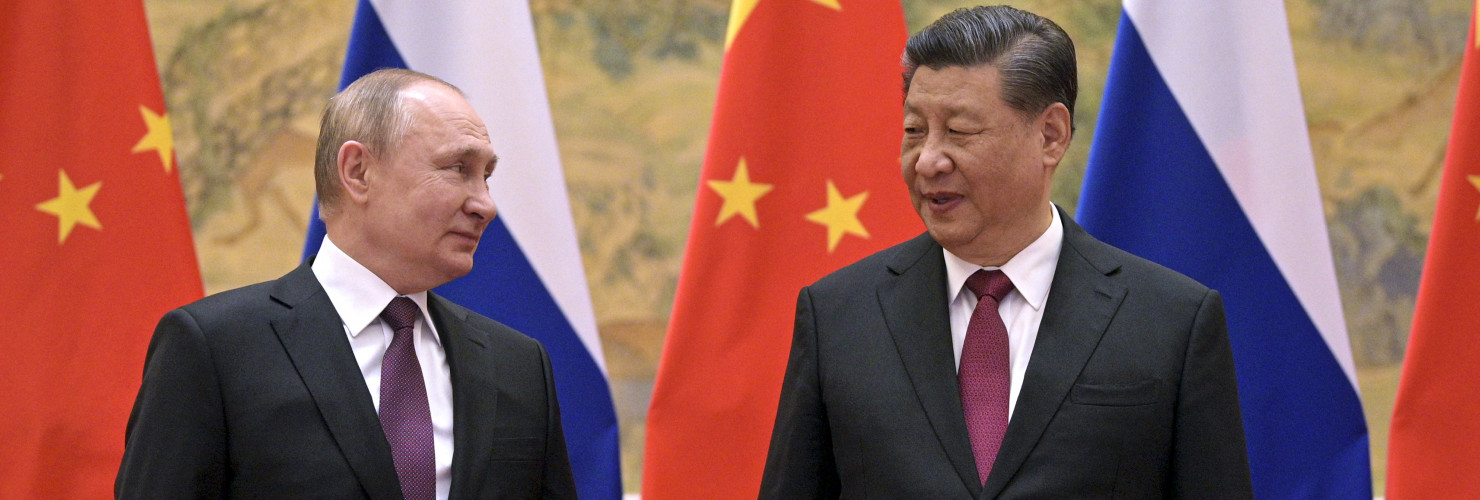

Keeping up appearances? China’s support for Russia one year into the war
In the discussion about which side it is on in the Ukraine war, China tells the EU not to worry about appearances. Mikko Huotari and Roderick Kefferpütz argue mixed signals do not hide it is siding with Moscow.
Pro-Russian neutrality, the Beijing straddle, sitting on the fence, a Chinese balancing act – different labels have been ascribed to China’s position on the war in Ukraine. But Chinese rhetoric and action over the last year and its new paper “Position on the Political Settlement of the Ukraine Crisis” provide a clearer picture of Beijing’s consistent Moscow-leaning alignment – although the ultimate direction of its geopolitical calisthenics remains difficult to gauge.
China published its position for a political resolution of the war in Ukraine in Ukraine on the anniversary of Russia’s invasion, February 24 – a day after abstaining from a UN resolution on the principles of the UN charter and the need for peace in Ukraine, and two days after China’s top diplomat, Wang Yi, was in Moscow to emphasize the strength of Sino-Russian relations. In parallel, Chinese representatives in Brussels and at the Munich Security Conference told EU officials to not “read too much into the terminology” and invest more in Europe’s “strategic autonomy”.
Confused? As contradictory as these positions appear, Beijing sees its stance as dialectically consistent. It derives from what it indeed considers as a a key "contradiction” in global affairs – strategic competition and eventually confrontation with the US and “its bloc”. It can be taken as a realist expression of how China’s leadership defines its global interests – keep relations with the country’s largest neighbor on track, stand with Russia on challenging US power, avoid Western sanctions, advance China’s standing and influence.
What Chinese officials tell their Russian counterparts in private about Ukraine is not known – although it is known that, in China, there are diverse views on this issue. What’s critical to understand is that Beijing’s official position has less to do with near-term concern for Ukraine than it does with its long-term strategic “struggle” with the US.
For now, China has Moscow’s back.
First, China has aligned with Russian narratives and its criticism of the West. Beijing refuses to label the war a “war” or an “invasion” – in Munich Wang spoke of the “Ukraine issue”. China’s state-run media regularly uses Russian footage and stokes anti-Western sentiments by calling the US and NATO are the culprits. The February 24 position paper blames “Cold War mentality” and criticizes unilateral Western sanctions.
Second, China has consistently abstained from or voted against UN resolutions criticizing Russia and voted for draft resolutions initiated by Russia. In the G20 and other fora, China has aimed to water down language criticizing Russia for the invasion of Ukraine. This has allowed it to hide a huge inconsistency in its approach: claiming to be a staunch defender of the UN Charter but treating the sovereignty and territorial integrity of Ukraine as a secondary concern.
Third, China over the last year has signaled almost unconditional support for deep strategic relations with Russia on all diplomatic levels. Visits by presidents, prime ministers, foreign ministers, parliamentary and party leaders all highlighted the strength of the relationship as well as the desire to deepen relations. China’s top legislator, Li Zhanshu, in September said that China fully supported Moscow’s need to secure its core interests and that Russia had been “cornered” and was counterattacking. These regular exchanges highlight the increased coordination flagged in the joint statement of February 4, 2022.
Fourth, China has increased its trade with Russia and is considering military aid. Chinese imports rose by 43 percent in 2022 and exports by nearly 13 percent; overall trade reached 190 billion USD, a significant increase from a pre-Covid-19 108 billion USD in 2018. Not only are Chinese companies providing financial support by buying lots of Russian oil and gas. They have expanded exports of critical semiconductors and of non-lethal military equipment to Russia. Recent media reports claim US intelligence knows Chinese state-owned companies are exporting shipping-navigation equipment, radio-jamming technology and jet-fighter parts. There is even speculation about China providing Russia with Chinese-made kamikaze drones.
Fifth, China has expanded military exercises and strategic coordination with Russia. 2022 was the first time that both countries organized regular joint air patrols and that China participated in a Russia military exercise with its ground, air and naval forces. The same week China published its “Position on the Political Settlement of the Ukraine Crisis”, it held military exercises with Russia and South Africa off the coast of the continent’s southernmost tip.
Collating and analyzing Beijing’s words and deeds show China is by no means a neutral actor – and that any expectations the country could be a good mediator between Russia and Ukraine are misplaced. Western media have wrongly taken to calling China’s position paper a “peace plan”. While every opportunity should be used, it is difficult to see how Beijing could contribute to any just and lasting peace at the moment. It is signaling neither any readiness to conditionalize its support for and put other meaningful pressure on Moscow – nor to talk seriously about peace with Ukraine’s leadership.


